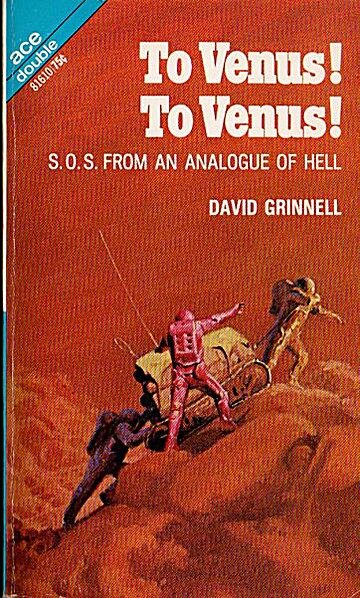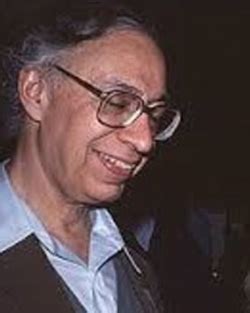David Grinnell (Donald Wolheim, 1914-1990)
In 1970, shortly after Neil Armstrong spoke his inspired words, Chet Duncan found himself trudging up a steep incline, swishing through the moon dust, on his way to rescue a fellow astronaut, Jim Holmes, who had had a mishap with his Lunar walker. Holmes had been returning to the lunar lander when his robotic walker had frozen up and, not being mechanically inclined, he'd called for help. After replacing a shear pin in the lower axle, they both returned to the small vehicle and made preparations to return to the orbiting module, their "mother ship" as it were. Before they left, however, they received a radio message that the Russians had just landed the first Cosmonauts on Venus, which they described as balmy and temperate, with abundant and variegated flora. Since there was some competition between the United States and Russia over "first landings" on alien planets, and since Venus was known to the U.S. scientists as a wasteland of dust and rocks hovering at a temperature of at least 500 degrees Fahrenheit, there was some debate as to what the truth was regarding the status of the inner planet. It was assumed in the halls of Washington that Russia was ambitiously courting the good wishes of billions of their fellow Asiatic inhabitants, and that they would not be beyond exaggerating their spatial exploits and the discovery of a viable colonial site in order to capture the admiration of the oriental nations.
So NASA decided to send their own ship to the planet, just to clarify the picture, and to provide a bit of a challenge to the second Soviet vessel which was launched at the same time. Chet, Carter and Quincy were delegated as the team assigned to verify or disprove the Soviet claims. The three left in the module and after an uneventful trip reached an orbit around Venus. All three entered the landing "bug" as they termed it, and left the module which was designed to maintain an orbit by itself around the planet. They plummeted down through thousands of feet of dense clouds and only at several thousand feet above the ground were able to see the surface clearly. High winds bounced the small bug around and when they finally landed, they discovered that one of the legs on the machine had been irreparably damaged, prohibiting take-off. The landing had placed them on the sheltered side of a cliff, but the overhang would prevent them from being able to maneuver the bug into take-off position. At first they assumed they were doomed, but then they remembered that the Russian vessel had already landed about 100 miles away from their location. So the decision was made to attempt to walk to the Russian camp. The three donned their servo-powered suits of armor, loaded up a power sled with their remaining supplies and began trudging. The terrain was full of loose rocks and cracks and crevices that required them to follow a circuitous path while fighting the constant wind at the same time.
After struggling ahead for several days the party arrived at a cliff that seemingly blocked the way ahead. But after a considerable time spent in looking for a way up, they found a cave that appeared to be fairly deep. And so it proved. Using their suit flashlights, they spent days crawling and walking through tunnels, all the while gradually gaining height as they went. The food and water started to run low, and Carter, who had been depressed about their chances to begin with, vanished one night and the next "morning' they found his belongings and suit parked near a bottomless drop-off. With the slight addition to their supply cache, the two continued on, laboring their way along, until they reached yet another cliff which was soon found to contain yet another cave. In a few more days, as their water was about to give out, they found some rivulets in a dark corner. But Quincy was getting tired of the trek and, angry at the hopelessness of their situation, he opened up his face plate to end it all. To his surprise he realized that he could breathe. They had evidently reached an altitude at which oxygen was available. They theorized that since the poles were covered with ice five miles deep and the temperate zones were so hot, that when the icecaps were melted at the edges, the resulting run-off would be entirely evaporated, freeing the oxygen to accumulate just below the cloud layer.
At any rate, the two, heartened, continued on until they received a garbled message on their radio which they were able to interpret as Russian. They soon arrived at the Soviet camp site and were given to understand that all the Cosmonauts had died except one and he was very sick. And that, at this elevation, the terrain was indeed covered with strange plants and grasses suitable for human activities. After they healed the Russian with some of the medicines they had brought along, all three flew up to the Russian module and headed back to Earth.
This was a science fiction horse of a different color; i guess it would be categorized as "hard" sci fi. But as a variant of the space voyages of the late sixties and early seventies, it was pretty interesting. Although i did slightly balk at the heroes finding all those caves just when they needed them. Wolheim was a good writer, tho, and even if i was hesitant about reading this effort for "sci fi January" due to it being the second book by the same author, i was glad i did. It riveted my attention, more or less, and provided interesting descriptions of some of the chemical and geological mysteries of Venus, which, even if they weren't true, were diverting... Probably next weekend i'll be back with another sort of book, now that January is over...


Who knew it was "sci-fi January"? Not me. Anyway, this one sounds pretty interesting for any month.
ReplyDeletei picked up on the idea last year from Jean@howling frog blog, devoting Jan to blogging about old sci fi books just to get the year started off right lol... i requested her permission first, of course...
DeleteInteresting that he sees the Russians and the Americans cooperating at that time--not necessarily the usual view...
ReplyDeletebut not until they absolutely had no choice... but they got along okay once they got together, which probably is pretty lifelike... in that sort of situation anyway...
DeleteAt least you might hope so! Though sometimes I wonder...
DeleteI think I would like this one...the whole competition to land on other planets first, and visiting Venus...it sounds like some classic sci-fi fun.
ReplyDeleteit was okay and had interesting points; but the actual space flight and physical descriptions of Venus were a bit off the wall, i thought... i don't remember what we knew about Venus back then, but i don't believe they imagined a highland of livable terrain, lol... but in spite of that, it WAS fun!
DeleteDo you know what I've noticed? That science fiction writers look like science fiction writers, lol!
ReplyDeleteI remember that my attention wandered with C.S. Lewis' descriptions of Perelandra so this book might get me daydreaming. On the other hand, I do like the sound of the competition.
I'm very eager to see what your first February read will be!
haha: pretty astute, Cleo! i recall years back of thinking that the same was true of physicists (my dad was one)...
DeleteI am a big fan of "hard" sci fi. These are the best. Sorry I haven't been posting. Still trying to get back on my feet and also busy with my book promotion.
ReplyDeleteHope you all are well!
it takes time to recover from major stuff... don't push yourself. it was a pretty good read and surprisingly historical at times...
Delete